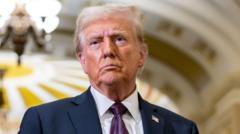The U.S. Supreme Court has officially declined Donald Trump’s last-minute effort to pause his sentencing in connection with his hush-money criminal case, allowing the proceedings to take place as planned on January 10. This decision comes after Trump’s claim that he deserved an automatic stay of his sentencing was rejected in a narrow 5-4 vote by the justices.
The ex-president had been convicted of falsifying business records by disguising a $130,000 hush-money payment to Daniels as legal expenses during the 2016 presidential campaign. Despite Trump's expectation of a delay, Justice Juan Merchan, presiding over the case, affirmed he would not consider options for jail time, indicating that the possible penalties would not include incarceration.
In this ruling, two conservative justices, John Roberts and Amy Coney Barrett, joined forces with the three liberal justices to form the majority. The court's opinion suggested that any concerns raised by Trump could be adequately addressed during the appeal process. They also noted that the burden of attending a sentencing hearing was minimal.
Trump's legal team had also put forth questions regarding whether a president-elect could claim immunity from criminal prosecution. The New York prosecutors, however, argued compellingly against this notion, emphasizing the public interest in proceeding with the sentencing without delays.
The courtroom skirmishes leading up to the Supreme Court's decision had seen multiple lower courts already deny Trump's attempts to delay proceedings. The Manhattan District Attorney's office rebuffed Trump’s immunity argument as lacking support from any judicial precedent, underscoring the fact that the nation only has one president at any given moment.
In contrast, a group of former public officials and legal authorities submitted an amicus brief urging the Supreme Court to reject Trump's plea, reiterating that escaping accountability is not an option.
The backdrop to the legal turmoil includes a previous major ruling where the conservative majority court acknowledged presidential immunity for "official acts," providing Trump with a degree of protection in a separate case about the 2020 presidential election.
As Trump's legal strategies continue to unfold, questions remain regarding his future and the implications of his legal challenges on his upcoming term as president.
The ex-president had been convicted of falsifying business records by disguising a $130,000 hush-money payment to Daniels as legal expenses during the 2016 presidential campaign. Despite Trump's expectation of a delay, Justice Juan Merchan, presiding over the case, affirmed he would not consider options for jail time, indicating that the possible penalties would not include incarceration.
In this ruling, two conservative justices, John Roberts and Amy Coney Barrett, joined forces with the three liberal justices to form the majority. The court's opinion suggested that any concerns raised by Trump could be adequately addressed during the appeal process. They also noted that the burden of attending a sentencing hearing was minimal.
Trump's legal team had also put forth questions regarding whether a president-elect could claim immunity from criminal prosecution. The New York prosecutors, however, argued compellingly against this notion, emphasizing the public interest in proceeding with the sentencing without delays.
The courtroom skirmishes leading up to the Supreme Court's decision had seen multiple lower courts already deny Trump's attempts to delay proceedings. The Manhattan District Attorney's office rebuffed Trump’s immunity argument as lacking support from any judicial precedent, underscoring the fact that the nation only has one president at any given moment.
In contrast, a group of former public officials and legal authorities submitted an amicus brief urging the Supreme Court to reject Trump's plea, reiterating that escaping accountability is not an option.
The backdrop to the legal turmoil includes a previous major ruling where the conservative majority court acknowledged presidential immunity for "official acts," providing Trump with a degree of protection in a separate case about the 2020 presidential election.
As Trump's legal strategies continue to unfold, questions remain regarding his future and the implications of his legal challenges on his upcoming term as president.




















